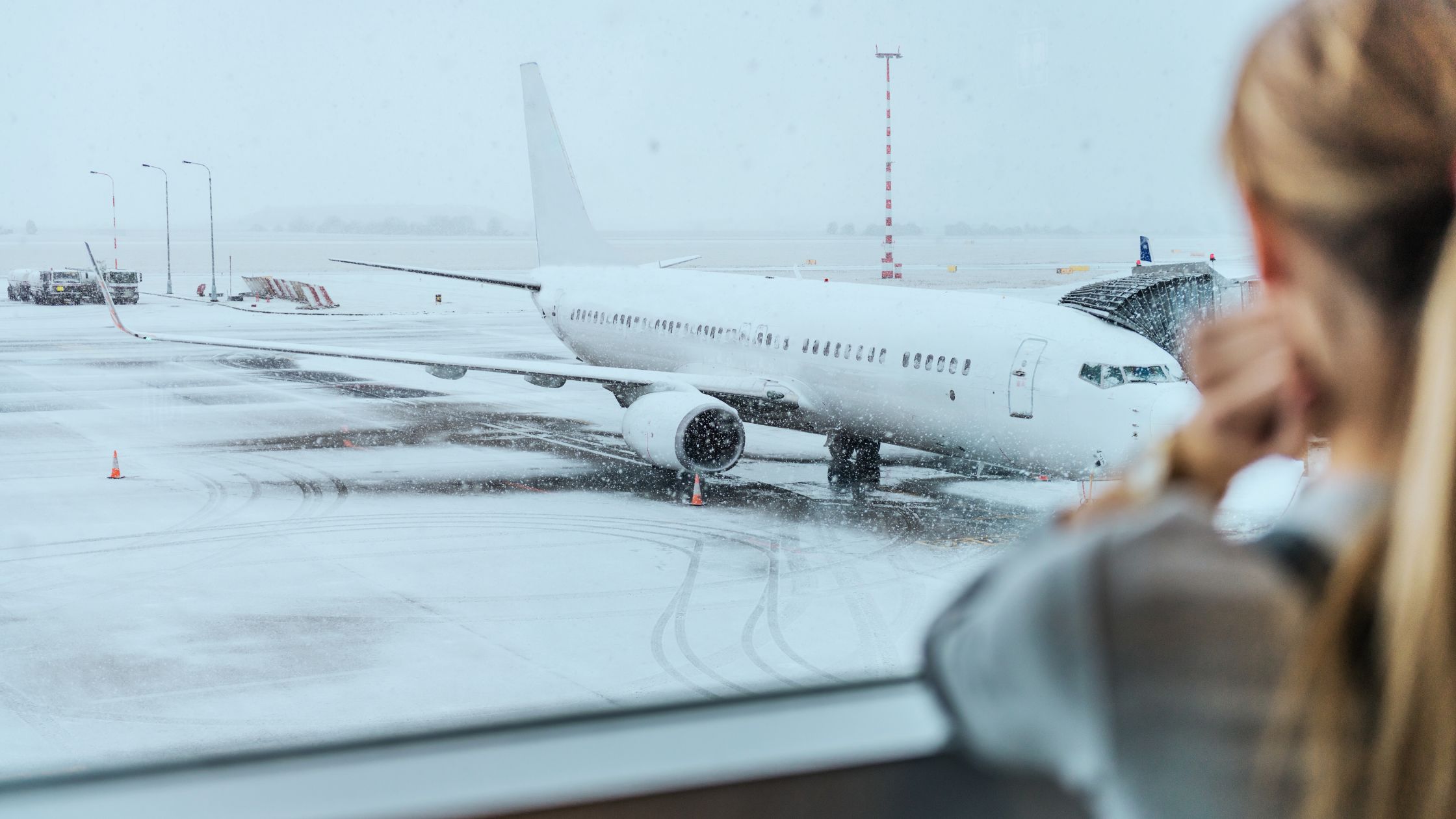Traveling while experiencing grief can be a revitalizing experience. I know because I’ve been there.
My father died unexpectedly in February 2024 and it has altered my entire being. In an instant, my life priorities, goals, physical DNA, and mindset changed drastically. I am not the same person.
Suddenly, it was hard to focus on anything outside the ideas of just wanting to escape. A few months after his death, my mom, sister, and I decided to take a trip to Greece. My mom had decided years before that she wanted to take this trip for her 65 birthday. Given the circumstances, we felt it was best to get out of town, out of the country.
Handling grief isn’t easy and we all process death differently. There is no one way to handle it. I’ve found traveling to be therapeutic, even while missing a person so vital to your existence.
Let’s talk about grief, how to handle it, and how travel can help you move forward.
What is Grief?
When losing someone, the truth is, you will never move on. You’ll only move forward.
The other truth about losing someone is grief is not a linear process. You may experience the fives stages of grief in no particular order and sometimes multiple times a day.
Grief is a complex, deeply personal process that affects everyone differently, yet it commonly unfolds in several stages.
Recognizing these stages can help us navigate our emotions more effectively:
- Denial: Initially, we might refuse to believe the loss has occurred, leading to a sense of emotional numbness
- Anger: As the reality sets in, feelings of frustration and helplessness can manifest as anger
- Bargaining: We may ruminate on what could have been done differently to prevent the loss
- Depression: A profound sadness and a sense of loneliness often emerge as the situation’s reality fully sinks in
- Acceptance: Eventually, we come to terms with the loss, although this doesn’t mean the pain is gone, but that we are learning to live with it
With this, grief can also drain your energy, which could make the thought of planning a trip feel overwhelming. However, a change of scenery can sometimes offer a respite from the pain of everyday surroundings and memories related to the loss of your loved one.
Whatever the case, it’s vital to recognize and respect your feelings without judgment and ask others in your circle to do the same. Allow yourself the space and time to grieve. Pushing yourself to move on too quickly can hinder the healing process.
3 Pre-Trip Preparations Tips

Travel can serve as a healing and coping mechanism for those grieving, but it’s crucial to ensure you are genuinely ready to step out into a new environment. Try not to force yourself into a trip you may not be ready for.
Here’s how to prepare for a trip that accommodates your emotional state and aids in your healing process:
1. Deciding When You’re Ready to Travel
There is no single right or wrong path in choosing when to travel. For some, it may be the reaction that feels most normal, for others, it may take time to sort through your emotions.
Whatever the case, here are some things to pay mind to when finding the perfect place to travel to:
- Listen to Your Emotions: Gauge your current emotional state and ask yourself if you feel mentally and physically prepared to handle the uncertainties of travel
- Consult with a Therapist or Support Group: Sometimes talking with a professional or others who have been in similar situations can provide clarity on whether you’re ready to travel
- Start Small: If you’re unsure, consider a shorter or closer-to-home trip to test how you feel about traveling while grieving
Short roadtrips or even weekend getaways to a nice hotel may be all that you need. It really is up to you and how you’re feeling. You’ll know what’s right. If you don’t ask for help or advice.
2. Choosing the Right Type of Trip
You’ll have a preference when it comes to choosing your trip. Some might need the solace of a solo trip while others might find new joys in traveling with a group.
Here are other types of trips you might consider when choosing your style of trip:
- Solo Trips: Traveling alone might give you the space to reflect and heal at your own pace without the need to adhere to others’ schedules
- Group Trips: Opting for a group trip can provide built-in social support with best friends or a family member who understand what you’re going through
- Retreats: Look for retreats that focus on healing and wellness, which can offer therapeutic activities and guided sessions. Sometimes, being surrounded by strangers are great travel companions because they don’t know your situation can give you some relief too.
- Nature-Focused Excursions: Being in nature can be incredibly soothing; consider destinations known for their natural beauty and tranquility
3. Practical Tips for Planning
Our trip to Greece was the best possible place for my mother, sister, and I to recoup. Every single encounter we had in Greece was full of kindness and gentleness. Keep in mind the destination you’re traveling to and how it might affect your mood.
It’s easy to drop hundreds or thousands of dollars on a trip without thinking of the long term cost. There’s nothing wrong with just mindless purchases such a hard time, but make sure you’re protecting yourself from long term financial challenges that may occur.
Otherwise, here are some other helpful tips for planning:
- Budgeting: Set a realistic budget that allows comfort without financial strain. Look for accommodations and activities that are not too taxing but enriching.
- Choosing Destinations: Pick destinations that promise a sense of peace or exhilaration, depending on what you feel is missing from your life. Avoid places that hold strong emotional memories that might trigger sadness or places that might experiencing societal difficulties.
- Duration: The length of your trip should give you enough time to unwind without feeling rushed. A too-long trip might feel daunting, so balance is key.
- Accommodations: Choose where to stay based on comfort and peace. A quiet hotel room, a cozy Airbnb, or even a scenic campsite can offer the solace you might need.
As you plan, remember that the goal is not to escape grief but to live with it in a way that feels more manageable.
A well-planned trip can provide respite and a fresh perspective, helping to facilitate the healing process. Make sure to pace yourself and adapt your plans as your needs and feelings evolve. Plan some tours and experiences but leave space for the unknown so you can feel the world again.
Packing Essentials for Emotional Comfort
When traveling while grieving, the contents of your suitcase are more than just practical necessities; they are comforts for your heart and soul. Obviously, you don’t want to pack too many things in your suitcase, so take what’s necessary.
Packing thoughtfully can help you face the journey with resilience, bringing along items that nurture your emotional well-being.
Here are some essentials to consider.
Items That Comfort You

What you bring is up to you, but there are a few items you can tote along to help comfort you on your journeys.
- Photos and Keepsakes: Pack photos of your loved one or small keepsakes that remind you of happy times. These items can provide comfort during moments of loneliness or sadness. I brought along a urn necklace with my dad’s ashes so it felt like he was always with me.
- Jessica’s Journal: Bring a journal to help document your feelings. One of my favorites, which I find helps with grief, depression, and anxiety is Jessica’s Journal. It contains mental health trackers and spaces to write memories, which can be a therapeutic way to engage with your feelings during the trip
- Aromatherapy and Essential Oils: Scents like lavender, chamomile, or peppermint can be soothing and help manage stress. Portable diffusers or roll-on oils are easy to pack.
- Comfortable Clothing: Soft, cozy clothing like a favorite sweater, comfortable shoes, or a warm scarf can provide physical comfort, which is especially important during grief.
Books, Music, and Therapeutic Activities

While enjoying your escape from reality, don’t skip out on items that can take you a step further. Things like reading, listening to music, and adult color books can block out the world and offer a more extensive journey.
Here are some other items you might consider bringing along:
- Books on Grief: Include books that can resonate with your experience, like Joan Didion’s “The Year of Magical Thinking.” Didion’s reflection on her year of mourning provides insight and companionship through shared experience, which might be just the thing you need.
- Music and Playlists: Create a playlist of music that soothes you or brings back good memories. Music can be incredibly healing and a way to feel connected to lost loved ones. Music can also help you grieve and cry when you need to.
- Drawing or Coloring: Pack drawing materials or a coloring book. These activities are not only therapeutic but also help in managing anxiety and providing a quiet, meditative focus.
Health Essentials To Keep You Energized

Grieving can take so much energy and attention. At times, you may feel fatigue, insomnia, restlessness, depression, anxiety, stress, and anger. For this entire range of emotions, be sure you’re managing your physical self appropriately.
What that looks like is entirely up to you, but here are some of my favorite items for physical care:
- Medications: Always pack any prescribed medications you need. Include a few days’ extra supply in case of travel delays.
- Skincare: Travel can be hard on your skin, so bring your regular skincare products to maintain your routine and comfort. Doing your skincare every morning and evening is a form of self-care that gives you that extra boost.
- Footcare: Comfortable walking can make a trip more pleasant; consider packing good quality foot cream, foot masks, nail polish, and other items for pampering.
- Supplements: If you use supplements to manage your health, make sure to bring them along. Products like magnesium, vitamin D, ashwagandha, or omega-3 supplements can help support overall well-being and reduce anxiety and stress. Of course, consult your PCP before making decisions on these supplements.
By packing items that provide emotional comfort, help process grief, and maintain your health, you equip yourself to handle the emotional waves you might experience during your vacation.
Each item you pack is not just taking up space in your suitcase; it’s there to support you, offering familiarity and comfort as you navigate both new landscapes and your inner journey of grief.
What to Do During the Trip

Traveling while grieving can offer a unique opportunity for reflection and healing. Here’s how to make the most of your journey:
Engaging in Activities That Foster Reflection and Peace
- Journaling: As mentioned earlier, you can carry a journal to record your thoughts and feelings as you experience new surroundings. It can serve as a private, therapeutic outlet and a way to document your healing journey.
- Meditation or Yoga: Dedicate time for meditation or yoga, even if it’s just for five minutes. Whether in your accommodation or a tranquil spot you discover on your travels. Apps or guided audio meditations can assist in this practice.
- Visiting Serene Places: Seek out quiet, serene environments—such as parks, gardens, beaches, or religious sites—that can offer solace and space for contemplation.
Balancing Between Staying Connected and Unplugging
Stay in touch with loved ones back home to feel supported, but also give yourself permission to disconnect from digital distractions. This balance can help you stay grounded and focused on your healing process.
Managing Grief Symptoms While Away from Home
Recognize that grief can surface unexpectedly, and be prepared with coping mechanisms like deep breathing exercises or brief walks. Don’t hesitate to reach out to a therapist or support group, many of which are accessible online, if you find yourself overwhelmed.
By actively engaging in peaceful activities, maintaining supportive connections, and managing emotional challenges, your trip can become a meaningful part of your journey through grief.
Finding Solace in New Experiences

Embarking on new experiences during a time of grief can profoundly influence the healing process. Psychological studies suggest that novel environments and experiences can stimulate the brain, potentially alleviating symptoms of depression and anxiety, common companions of grief.
How New Experiences Can Aid the Healing Process
Engaging with new cultures and environments can provide a distraction from the pain of loss, offering a mental respite as you encounter unfamiliar sights, sounds, and activities.
This exposure can shift your focus and gradually help integrate the reality of loss into your life with new perspectives. Many people find unexpected healing during travel.
Tips on Embracing New Cultures and Environments While Honoring Your Feelings
- Be open to local traditions and activities—they can offer unexpected comfort and insights.
- Allow yourself to feel both joy and sadness; honoring your feelings is crucial for genuine healing.
- Use travel as a way to celebrate memories of your loved one, perhaps by choosing destinations they loved or you had planned to visit together.
Through new experiences, many find that travel doesn’t just change their geography but also their heart and mind, providing a path to solace and renewal in the face of grief.
3 Tips For Returning Home

Returning home after traveling with grief can be a poignant moment, marking both an end and a beginning in your healing journey. My mom, sister, and I were in Greece for nine days. It was long enough to be enjoyable but by the end, we were ready to come home and back to our lives.
We were able to share our photos, talk about our experiences, and ultimately the trip helped us get closer.
Here’s how to integrate the travel experience into your ongoing process of grief and adjustment.
1. Integrate the Travel Experience into Your Healing Journey
Reflect on the moments during your trip that brought you peace or insight. Consider keeping a memento or photo visible in your home as a reminder of the strength and renewal you experienced.
Write down key lessons or feelings you encountered while away. This can help solidify the healing benefits of your journey.
2. Practical Advice for Transitioning Back to Daily Life
Ease back into your routine without rushing. Allow yourself to slowly readjust to daily life while recognizing that your grief journey is ongoing. I recommend giving yourself one extra day before returning back to work and your other responsibilities. It gives you a chance to recollect yourself and plan for the coming weeks,
As a final note, keep some elements of your travel in your daily routine, whether it’s meditation, walking in nature, or journaling, to maintain the continuity of healing.
3. Reflecting on the Growth and Understanding Gained from the Trip
Take time to appreciate how the trip helped you cope with or understand your grief better. Acknowledge any changes in your perspective or emotional state that occurred. And if they trip was more difficult than you expected it to be, give yourself some grace. You are doing the very best you can.
Returning home doesn’t mean the journey is over. It’s an opportunity to continue nurturing the growth and understanding you’ve gained, using travel as a powerful tool in your healing process.
Additional Resources on Grief
If you need a little extra support on your journey through grief, there are a wealth of resources to help you through.
Here’s a list of resources including books, websites, apps, and organizations to look into:
Books
- “The Year of Magical Thinking” by Joan Didion
- “On Grief and Grieving” by Elisabeth Kübler-Ross and David Kessler
- “It’s OK That You’re Not OK” by Megan Devine
Websites
- What’s Your Grief: Offers extensive resources and information on various aspects of grief
- The Grief Toolbox: Provides articles, resources, and an online community for sharing and learning about grief
Apps
- Grief: Support for Young People: Provides tailored support for younger individuals dealing with grief
- We Remember: An app that helps create virtual memorials and share memories of loved ones
- My Grief Angels: A free app for peer and social support, plus resources for those who are grieving
- Untangle Grief: An app offering guided support sessions and resources to help manage grief with personalized tools and community features
Organizations
- The Compassionate Friends: Supports families after a child dies
- National Hospice and Palliative Care Organization: Offers resources on grief and loss
- GriefShare: A network of support groups for people who are grieving, providing a program that includes videos, group discussions, and personal study
Instagram Accounts
- @refugeingrief: Managed by Megan Devine, author of It’s OK That You’re Not OK, this account offers heartfelt insights and supportive messages
- @thegriefcase: This account features personal stories and artistic expressions of grief, aiming to normalize the conversation around loss
- @goodgrieftrust: Offers tips, support, and shared stories from people who have experienced loss, highlighting resources and events
TikTok Accounts
- @griefbulb: Features short videos that offer advice on dealing with grief, personal stories, and tips for self-care during tough times
- @griefcoach: Provides quick insights and practical tips for managing grief, focusing on both emotional and practical support
- @thegriefgallery: This account shares user-submitted stories and artifacts of loss, creating a community space for shared mourning and understanding
Contact Information for Professional Help
- Crisis Text Line: Text “HELLO” to 741741 for free, 24/7 support in the US
- SAMHSA National Helpline: 1-800-662-HELP (4357) – A confidential free, 24-hour-a-day, 365-day-a-year, information service, in English and Spanish, for individuals and family members facing mental and/or substance use disorders
These resources can provide valuable support and information to help navigate the complex emotions and challenges associated with grief.
Do What’s Best For You, Always
Traveling to Greece after my dad’s sudden passing was a healing escape. It’s essential to tune into your emotions, choose a calming destination, and pack items that provide comfort and solace.
On the trip, balance reflective moments with time unplugged from the digital world. Integrating these experiences into everyday life back home helps continue the healing process.
Remember, travel isn’t about moving on but moving forward, carrying cherished memories as part of your journey through grief.










